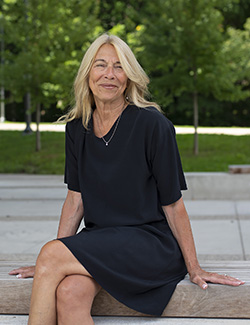Nursing at Western: Strengthening the Nursing Workforce and Research Capacity
Director's Update, November 2023

Victoria Smye, RN, PhD, FCAN
Recently the School began the process of thinking through our strategic directions – a journey into exploring the vision and planning for the next five years; this in the context of an unprecedented nursing shortage, a dramatic shortage of primary care providers (6.5 million Canadians are without a primary care provider), shifts in Nurse Practitioner (NPs) and Registered Practical Nurses (RPNs) scope of practice, exponential growth in technologies, the continued dominance of biomedicine and associated expenditures and a neoliberal-driven economy with its associated health and social inequalities. In our view, this presents an opportunity and the necessity for nursing to reinvigorate, refresh and re-invent itself – to disrupt the status quo and take a leadership role in addressing these ‘wicked problems.’ To achieve this we believe we need to prepare a strong workforce of transformative formal and informal leaders in nursing and to continue to form and grow strong interprofessional and international partnerships with a diverse array of stakeholders, including research allies. This newsletter provides a bit of an update.
Over the last few years, the School has been expanding its seats in undergraduate and graduate education and, in response, faculty and staff positions. Recently, our undergraduate admissions have focussed on diversifying the applicant pool – for example, we have created an RPN stream in the BScN Compressed Time Frame (CTF) program, our 19-month program for those with university education (since 2022/23), and explicitly invited the interest of Western student applicants from within the Faculty of Health Sciences (e.g., Kinesiology and Health Studies) and beyond. We believe this diversification will serve to enrich the student experience and nursing. At this time, we are working with WeRPN to create a second RPN stream in the CTF program – a stream for those without university education but extensive practice and professional development experience. In addition, in collaboration with our practice partners, we have expanded 1:1 preceptor intensive placement experiences into all placement experiences across both the CTF and 4 yr. BScN Western-Fanshawe Collaborative (W-F) program; and included a clinical group placement experience in long-term care in second year in the W-F program. Over the summer, fall, and winter of 2023/24, the total placement number will be 2048 with an expectation that this will increase to 2383 in 2024/25 due to our expansion. We are grateful to our practice partners for their continued support for, and commitment to, ensuring high-quality intensive placement experiences for our students – placements designed to better support the entry-to-practice transition. Coupled with these changes is the growth of lab/simulation experiences where students can learn and practice their skills, including clinical decision-making and expanding their experience with technology – hands-on engagement in a safe space. To accommodate the increase in student numbers and our new practice model, lab/simulation expansion is in progress and almost completed – new labs with state-of-the-art equipment to simulate the realities of our social world, as well as the diversity of populations and health issues. Thanks to our donors, we have been able to continue to ensure an experience that is commensurate with the practice environment.
In addition to growth in the undergraduate program, there is growth in the MN-Leadership in Professional Nursing Practice (MN-LPNP) fully online one-year program (currently 95 students) and the Ontario Primary Health Care Nurse Practitioner program – the 9-university consortium program; growth from 100 – 300 seats (40 seats at Western).
Last, but certainly not least of all, we have been building research capacity through our investment in supporting our new faculty; ongoing mentorship and alliances both within the university and beyond, locally, regionally, provincially, nationally and internationally have supported this goal. The Research Officer position in the School has been pivotal in this regard. Also, donor support, for example, faculty fellowships, have been instrumental in supporting new assistant professors as they build their programs of research during the early pre-tenure years. Strong publication records and significant research grant attainment are testaments to the success of this kind of support. Notably, scholarship support has been greatly appreciated by graduate students who are engaged in research (Master’s and PhD theses). Research strength and foci in the School remain in the areas of mental health; violence, gender and health; women’s health, global and Indigenous health and digital health, across the lifespan and permeating society with the goal of being transformative – in homelessness, poverty, migrant/newcomer health, virtual reality, artificial intelligence and machine learning, gender-based violence, socio-political and racial violence, maternal and child mental health, Indigenous mental health, and older adult healthcare. Of course, our Endowed Chairs and Canada Research Chairs are a tremendous support for research capacity building.
Currently, research is attached to all program areas, i.e., we are investing in evaluating all of our programs, both new and continuing and in several areas alongside our stakeholders, e.g., with our practice partners. In addition, all programming is viewed and advanced through an equity, diversity, inclusion and decolonization lens.
This is just a brief snapshot of our programming as we continue to work to respond to local and global need – an ever-evolving state of being.
Victoria Smye , RN, PhD, FCAN
Director, Arthur Labatt Family School of Nursing

